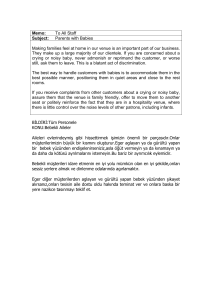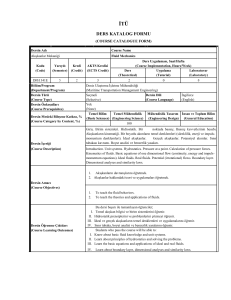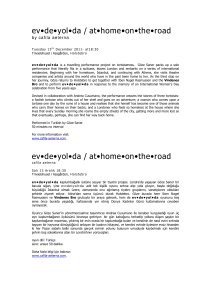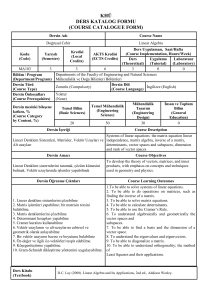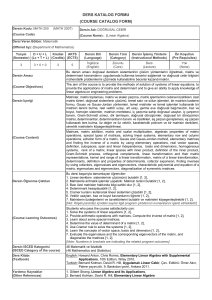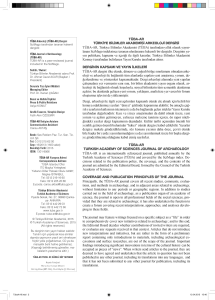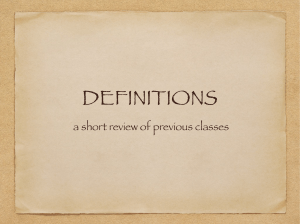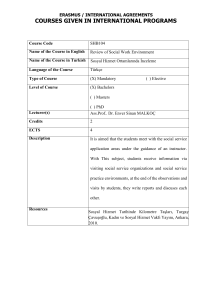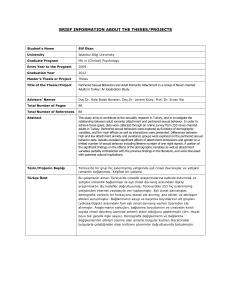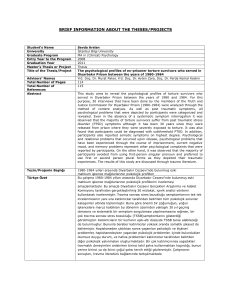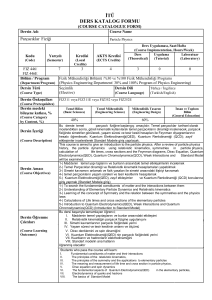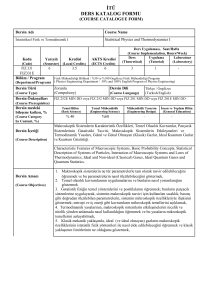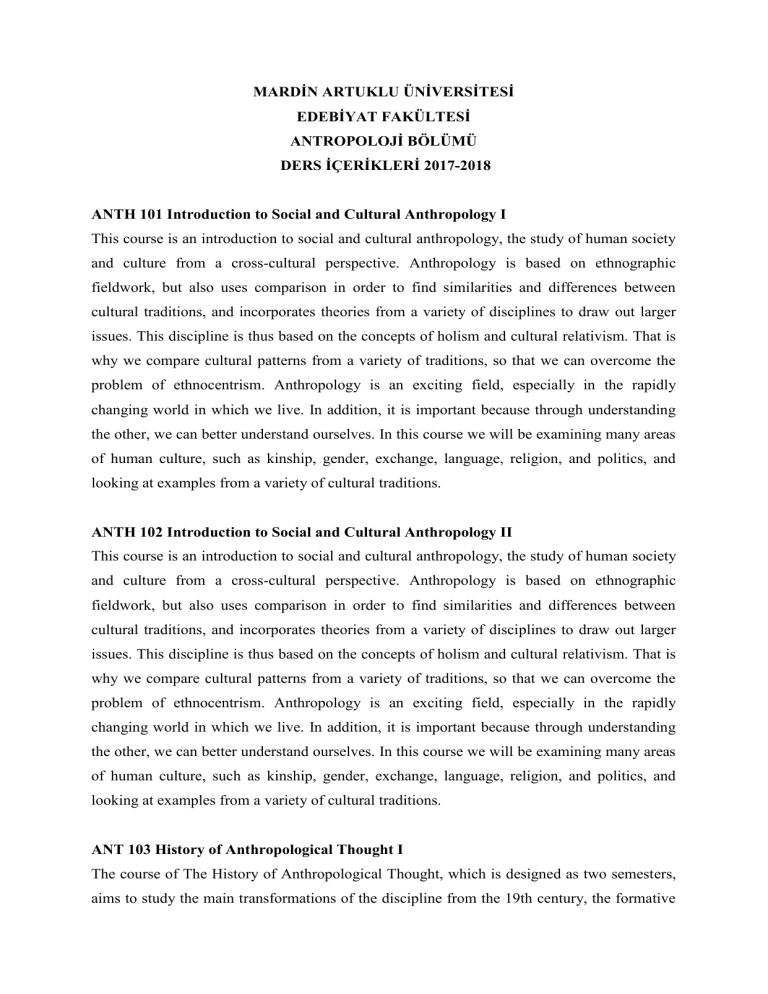
MARDİN ARTUKLU ÜNİVERSİTESİ
EDEBİYAT FAKÜLTESİ
ANTROPOLOJİ BÖLÜMÜ
DERS İÇERİKLERİ 2017-2018
ANTH 101 Introduction to Social and Cultural Anthropology I
This course is an introduction to social and cultural anthropology, the study of human society
and culture from a cross-cultural perspective. Anthropology is based on ethnographic
fieldwork, but also uses comparison in order to find similarities and differences between
cultural traditions, and incorporates theories from a variety of disciplines to draw out larger
issues. This discipline is thus based on the concepts of holism and cultural relativism. That is
why we compare cultural patterns from a variety of traditions, so that we can overcome the
problem of ethnocentrism. Anthropology is an exciting field, especially in the rapidly
changing world in which we live. In addition, it is important because through understanding
the other, we can better understand ourselves. In this course we will be examining many areas
of human culture, such as kinship, gender, exchange, language, religion, and politics, and
looking at examples from a variety of cultural traditions.
ANTH 102 Introduction to Social and Cultural Anthropology II
This course is an introduction to social and cultural anthropology, the study of human society
and culture from a cross-cultural perspective. Anthropology is based on ethnographic
fieldwork, but also uses comparison in order to find similarities and differences between
cultural traditions, and incorporates theories from a variety of disciplines to draw out larger
issues. This discipline is thus based on the concepts of holism and cultural relativism. That is
why we compare cultural patterns from a variety of traditions, so that we can overcome the
problem of ethnocentrism. Anthropology is an exciting field, especially in the rapidly
changing world in which we live. In addition, it is important because through understanding
the other, we can better understand ourselves. In this course we will be examining many areas
of human culture, such as kinship, gender, exchange, language, religion, and politics, and
looking at examples from a variety of cultural traditions.
ANT 103 History of Anthropological Thought I
The course of The History of Anthropological Thought, which is designed as two semesters,
aims to study the main transformations of the discipline from the 19th century, the formative
period of the discipline as an independent academic field, to the first quarter of the 21st
century, in the light of the works of pioneering theoreticians and schools that established the
discipline. In the first semester, the basic epistemological and political factors that guide the
birth of discipline will be introduced in the light of the works of founding names. Then the
basic anthropological theories developed about the nature of culture, society and historical
change will be introduced.
ANT 104 History of Anthropological Thought II
In the second semester of The History of Anthropological Thought course, the
anthropological vision will be introduced and analyzed in the light of decolonization process
occured after the Second World War, and of the epistemological debates on crisis of social
sciences in Europe. Structure, symbol, meaning, power, history, gender, nature of science,
folklism and representation crisis have been the basic concepts of anthropological thought that
developed in this period. The anthropology discipline which tried to determine its boundaries
and distinctive features in the formative period has undergone transformation both in work
themes and problematic while interacting with other social and human sciences developed
since the second half of the twentieth century. Understanding the ways this mutual-interaction
between anthropology and other social sciences shaped the character and vision of the
discipline
will
be
one
of
the
main
of
the
concerns
of
the
course.
ANTH 105 Academic Writing I
Academic writing can be in many forms. Normally academic writing differs from other types
of writing such as journalistic or creative writing. In most forms, a detached and objective
approach is required for academic writing. It is important to present research or arguments in
logical order and with a conclusion. Eventually, writing remains among the few key tools to
be successful in higher study. Inevitably it is an essential skill to master, especially in
University. However, writing always appears as a complex task and becomes comparatively
challenging in contrast to other tasks in educational institute. On the other hand, learning and
achieving expertise in a foreign language can be even more challenging task. Therefore, it
takes a steady and harmonious process to overcome the obstacles and to be trained on
academic writing in a foreign language. This course is designed to help students to develop
their writing as well as reading and speaking skills in English. It has a particular focus on
academic approach together with the basic language skills. Students are expected to enhance
their abilities in understanding academic English texts by examining and practicing selected
anthropological reading. At the end of the course, students will be prepared with a better level
of writing as well as other academic approaches in English language. Moreover, this course
emphasizes on a wide range of vocabulary exercise and various ways of word formation.
ANT 108 Fiziki Antropoloji
Fizik antropoloji, davranış, ekoloji, primat evrimi(insanı da kapsayan) konularını inceler. Bu
dersin konu başlıkları: evrim düşünce tarihi, genetik, kalıtım ve evrim, makroevrim, insan
olmayan primatlar, hominid evrimi ve orijini, modern insan biyolojisi. Kredi 3+0+0
ANTH 110 Academic Writing II
Academic writing can be in many forms. Normally academic writing differs from other types
of writing such as journalistic or creative writing. In most forms, a detached and objective
approach is required for academic writing. It is important to present research or arguments in
logical order and with a conclusion. Eventually, writing remains among the few key tools to
be successful in higher study. Inevitably it is an essential skill to master, especially in
University. However, writing always appears as a complex task and becomes comparatively
challenging in contrast to other tasks in educational institute. On the other hand, learning and
achieving expertise in a foreign language can be even more challenging task. Therefore, it
takes a steadies and harmonious process to overcome the obstacles and to be trained on
academic writing in a foreign language. This course is the advanced level of academic
English. It is mainly designed to help students to develop their academic writing and reading
skills, and has more intention on academic approaches in than the Basic English language.
This course is also aimed to give students different ideas on essay, assignment and report
writing as well as academic symbols and abbreviations.
ANT 201 Antropolojide Araştırma Yöntemleri I
İki dönem olarak tasarlanan ders bilim ve bilimsel araştırma nosyonlarını antropoloji disiplini
bağlamında farklı teorik ve pratik boyutlarıyla öğrencilere tanıtmayı amaçlıyor. Nitel
Araştırma Yöntemlerinin temel alınacağı dersin ilk döneminde nitel araştırmanın tarihsel
gelişimi ve temel özellikleri karşılaştırmalı bir perspektiften anlatılacaktır. Daha sonra nitel
araştırmanın temel yöntem ve araçları her bir yöntemin farklı boyutunu örnekleyecek
araştırma örnekleri ve etnografik çalışmalar ışığında incelenecektir. Böylece öğrenciler alana
inme, ilişki kurma, gözlem yapma, soru sorma, alanı farklı boyutlarıyla okuma, nitel veri
toplama ve alanda bulunmanın etik sorumlulukları konusunda somut bir fikir elde
edebileceklerdir. Dersin ikinci döneminde ise nitel veri analizi, farklı alan araştırması yazım
türleri ve araştırma raporu hazırlanması konuları değişik boyutlarıyla ele alınacak,
öğrencilerden saha çalışması yürütüp araştırma raporu hazırlamaları istenecektir. Kredi 3+0+0
ANT 202 Antropolojide Araştırma Yöntemleri II
İki dönem olarak tasarlanan dersin ikinci döneminde nitel veri analizi, farklı alan araştırması
yazım türleri ve araştırma raporu hazırlanması konuları değişik boyutlarıyla ele alınacaktır.
Öğrenciler saha verilerinin kaydedilmesi, örgütlenmesi ve yazıya geçirilmesi sürecini konuya
dair farklı kuramsal yaklaşımlar bağlamında ayrıntılı çalışma ve öğrenme imkanı
bulacaklardır. Ders sonunda öğrencilerin araştırma raporu hazırlama sürecini teorik ve pratik
boyutlarıyla öğrenmeleri amaçlanmaktadır.
ANTH 203 Anthropology of Religion
Religion has always been an especially fascinating area of culture for anthropologists to
study, since religious beliefs and practices reflect what a community considers most
fundamental to its worldview and way of life, and because they are intimately linked with all
other aspects of society and culture. This course is an introduction to the anthropological
study of religion through an examination of various aspects of religion, such as mythology,
ritual, magic and witchcraft. In order to understand the diversity of religious phenomena, we
will focus on examples from many religious traditions in the world, with the emphasis being
on non-Western traditional communities. We will discuss the many ways religion can be
defined, the different approaches anthropologists have taken to describe and interpret it, and
the many manifestations it can take in different cultural contexts. As with all areas of
anthropology, we will not evaluate the truth or falsehood of the material we study, but will
look at religious phenomena in their own cultural contexts in order to appreciate the diverse
ways humans have expressed their experiences of the sacred. Credit 3+0+0
ANT 205 Cultures of the Middle East
Religion has always been an especially fascinating area of culture for anthropologists to
study, since religious beliefs and practices reflect what a community considers most
fundamental to its worldview and way of life, and because they are intimately linked with all
other aspects of society and culture. This course is an introduction to the anthropological
study of religion through an examination of various aspects of religion, such as mythology,
ritual, magic and witchcraft. In order to understand the diversity of religious phenomena, we
will focus on examples from many religious traditions in the world, with the emphasis being
on non-Western traditional communities. We will discuss the many ways religion can be
defined, the different approaches anthropologists have taken to describe and interpret it, and
the many manifestations it can take in different cultural contexts. As with all areas of
anthropology, we will not evaluate the truth or falsehood of the material we study, but will
look at religious phenomena in their own cultural contexts in order to appreciate the diverse
ways humans have expressed their experiences of the sacred. Credit 3+0+0
ANT 212 Toplumsal Cinsiyet (Gender)
Bu dersin amacı, en genel anlamda öğrencileri toplumsal cinsiyet hakkında bilgilendirmektir.
Sosyal bilimlerde cinsiyete dair olgu ve özelliklerin analiz sürecine dahil edilebilmesi için
toplumsal cinsiyet alanındaki kavramlar, kuramlar ve yaklaşımlarla öğrencilerin tanıştırılması
gerekmektedir. Toplumsal cinsiyetin bütün sosyal sistemlerde etkin olan merkezi rolünün
kavratılması; aile, politika, gündelik yaşam, çalışma hayatı, hukuk, eğitim gibi alanlarda
toplumsal cinsiyet analizleri yoluyla öğrencilere farkındalık kazandırılması bu dersin ana
hedefleridir.
ANT 214 Sosyal Psikoloji
Sosyal bağlamdan çok, bireyin psişesine vurgu yapma eğiliminde olan bireysellik-kişilik
psikolojinin aksine, sosyal psikoloji, birey sosyal bağlam içinde ortaya çıkan duygu, düşünce
ve davranışlarını bilimsel olarak inceleyen bir psikoloji alanıdır. Başka bir ifade ile, sosyal
psikoloji duygu, düşünce ve davranış üzerinde grubun etkisini (sosyal etki) araştıran bir
disiplindir. Bu ders kapsamında, sosyal biliş ve algı, tutumlar, propaganda, uyma ve itaat,
yakın romantik ilişkiler, önyargı ayrımcılık, saldırganlık, grup dinamikleri vb. konularla ilgili
sosyal psikolojik kuramlar ve empirik araştırma verileri ele alınacaktır. Sosyal psikolojik
verilerin, sosyal problemlerin çözümüne sunduğu katkılar tartışılacaktır.
ANT 217 Paleoantropolojiye Giriş
Paleoantropolojinin temel kavramları tanımlandıktan sonra diğer bilim dalları ile ilişkisi
tartışılacaktır. Ardından evrenin oluşumu hakkındaki bilimsel teoriler üzerinde durulacaktır.
Buna bağlı olarak yeryüzünde ilk canlıların ortaya çıkışı ve farklılaşmaları incelenecektir.
Çevreye uyumun yeni türlerin ortaya çıkmasındaki rolü ve insanın gelişmiş biyolojik yapısını
kazanmasındaki etkisi ele alınacaktır. Antropolojinin bir alt disiplini olarak paleoantropoloji
hakkında kavramsal bilgiler vermek ve bu disiplinin ilgilendiği alanları tanıtmak. Bu
çerçevede canlı varlıkların yeryüzüne çıkış süreçlerini kısaca gözden geçirmek, canlılar
arasında insanın yerini ve onun diğer canlılar ile biyolojik yakınlık ve uzaklığını analiz etmek.
İnsanın yeryüzüne dağılımında çevresel etkiler, çevreye uyum ve buna bağlı olarak meydana
gelen mutasyonların oluş şeklini tartışmak. Çevreye uyum ve yaşam mücadelesi çerçevesinde
insanın yerleşik hayata geçmesi ile birlikte dil, kültür ve sanatın ortaya çıkış şeklini ele almak.
ANT 218 İnsanda Biyolojik Çeşitlilik
İnsan biyoçeşitliliği hakkında bilgi sahibi olmak dersin ana temasını oluşturmaktadır. Ders
insan biyolojik yapısını, çeşitliliğe yol açan özelliklerini, dünya üzerinde görülen biyolojik
türleri antropolojik bakış açısıyla değerlendirmeyi temel almaktadır. Dünyanın değişik
bölgelerindeki insanlarda görülen hastalıklar ders süresince örneklerle tartışılacaktır.
ANT 221 Sosyolojiye Giriş
Sosyolojiye Giriş dersinde, sosyolojik düşünmenin kavramsal çerçevesi üzerinde durularak
sosyolojideki temel kavramları açıklanmaktır. Bir bilim olarak Sosyolojinin gerçekleştirmeye
çalıştığı amaçlar, Sosyolojinin konusu ve metodu, Sosyolojinin tarihçesi, Sosyolojik temel
kavramlar, Sosyolojinin diğer sosyal bilimlerle ilişkisi, Sosyoloğun toplumdaki rolü,
Sosyolojik bakışın önemi ve geliştirilmesi, nesnellik sorunu, modern sosyolojinin kurucuları,
temel sosyolojik kavram ve tartışmalar bağlamında değerlendirilecektir.
ANT 222 Antropolojik Kuramlar
Antropolojik Kuramlar dersinde, Antropolojik düşünce geleneğine yön veren düşünürler ve
bunların Antropoloji bilimine katkıda bulundukları teoriler bağlamında tarihsel arka planları
dâhil edilerek kronolojik olarak işlenecektir. Böylelikle Antropolojik teorilerin ait oldukları
düşünsel miras ile birlikte değerlendirilerek daha kapsamlı bir Antropolojik muhayyileye dair
anlamlı bir katkı oluşturulmaya çalışılacaktır.
ANT 301 Feminist Kuramlar
Feminizm kavramının ortaya çıkışı 18. Yüzyıldan itibaren kadın hakları üzerine yazan,
mücadele eden Avrupa ve Amerikalı kadınların çabaları sonucunda gerçekleşmiştir. İnsan
hakları bildirgelerinin kadınları dışarıda tutmasına itirazlarla başlayan; oy, eğitim ve mülkiyet
hakkı talep eden birinci dalga feminist hareket birinci dünya savaşı ile sona erse de, daha
sonraki nesillere kazanılmış kimi haklar ve süregiden bir tartışma ve mücadele alanı
bırakmıştır. İkinci dünya savaşından sonra yeniden canlanan feminist hareket, kadın hakları
ve bunların yaşama geçirilmesi konusunu BM çatısı altında ele alan, devletleri bu hedefe
doğru yönlendirmeye çalışan, uluslararası bir mücadele alanı haline gelmiştir. Üçüncü dalga
feminist hareket ise, kadına dair konuşulmayan, tartışılmayan neredeyse hiçbir konu
bırakmamış, farklı feminizmlerin, farklı teorilerin ve farklı kurtuluş modellerinin ortaya
çıktığı, halen devam eden bir süreçtir. Feminist kuramlar dersinde, kronolojik olarak feminist
hareketin
ortaya
çıkışı
ve
gelişmesinin
yanı
sıra
farklı
yaklaşım
ve
teoriler,
kavramsallaştırmalar, mücadele deneyimleri ele alınacaktır.
ANTH 306 The Anthropology of Modernity
Modernity as a term in social sciences mostly refers to a theoretically elusive definition. As a
matter of fact we need to say „modernities‟ instead of the singular form of the notion. Scholars
discuss if the term need to be considered in a singular form to refer to a European origin of it,
or in its plural form to refer to the „rest‟ of the Western civilization as „the others‟ have
produced their own answers to it. Keeping the discussion at the background, this course aims
to develop an anthropological perspective on the question of modernity. It means that the
course treats modernity as an ethnographic object. The materialization of the modern not only
in the West but also worldwide is on the focus of the course. The course primarily concerns
with the modern contractions of the cultural, social and political life of the human beings.
Credit: 3+0+0
ANT 309 Archaeology And Culture
Sociological theories are changing fast through the discoveries of new information on human
society and culture all around the globe. Archaeology, in fact, plays a vital role for this
change. Especially, new archaeological findings and results of archaeological researches are
opening new perspectives on the origin and ways of human societies. Besides, archaeology
and cultural anthropology always have a deep relationship being the subdivisions of
anthropology. With the facts mentioned above, this course will explain social system and
cultural aspects of some of the most important prehistoric, protohistoric and classic
archaeological settlements in Turkey. Moreover, it will also focus on marine archaeology,
museum and museum studies, and the role and importance of archaeology in our modern
society. More importantly, as a subdivision of anthropology, this course will discuss on some
basic questions, e.g. why, how and whose archaeology we are doing.
ANT 312 Osteoloji
Osteoloji, kemikleri inceler. Bu derste öğrencilere insan iskeletine detaylı bir giriş sunulur. Ek
olarak öğrenciler, iskeletin bütün kemiklerinden biyolojik kimliklendirmeyi öğrenecekler.
Arkeoloji ve adli antropolojiyle bağlı olarak kazı alanında ortaya çıkan insan kalıntılarının
analizi sunulacak. Biyolojik yaş, cinsiyet boyla ilgili bilgi verilecek. Bu derste insan kemikleri
(kafatası, üst ekstremite, alt ekstremite, ve omurga kemikleri) ve dişlerini morfolojik olarak
incelenir. Laboratuar incelemeleri insan kemiklerini öğrenme ve pratik öğretme imkanı sunar.
Kemik patolojisi ve adli antropoloji hakkında bilgi verilir.
ANT 313 Ekonomik Antropoloji
İnsanların gereksinimlerini karşılama biçimleri (üretim ve bölüşüm) ve bu amaçla
gerçekleştirdikleri uygulamalar dersin ana temasında işlenecektir. Bu ders ekonomik
antropolojinin
temel
kavramlarına,
yaklaşımlarına
ve
kullandığı
yöntemlere
giriş
niteliğindedir. Derste öncelikle ekonomik antropolojinin tanımı ve gelişimini sağlayan
dinamikler ile farklı yaklaşımlar incelenmekte ve iktisat ile ilişkisi ele alınmaktadır. Aynı
zamanda ekonomik antropoloji alanının kendi içindeki farklı bakış açılarına da yer
verilecektir. Bu nedenle farklı toplumlarda üretim, mübadele, tüketim ve dağıtım kavramları
ele alınırken, bu alandaki bakış açılarının değişimi de göz önünde bulundurulacaktır. Ayrıca
derste kültürel açıdan, üretim, paylaşım, tüketim arasındaki ilişkiler ele alacaktır.
ANT 316 Eğitim Antropolojisi
İnsan merkezli bir süreç olan eğitim bireyin yaşadığı toplum içinde değeri olan, kabiliyet,
tutum ve davranış biçimlerini geliştirmesine olanak sağlar. Önceden belirlenmiş esaslara göre
insanların davranışlarında “istendik değişiklikler” meydana getiren planlı etkiler sürecidir.
Dolayısıyla bir amaca hizmet eden eğitim öğretim etkinlikleriyle işlerlik kazanır. Bu derste
amaç insan bilimi olan antropoloji ile insan merkezli bir süreç olan eğitimin birbirinden
bağımsız olmadığı tam tersine birbirini tamamlayan öğeler olduğunu ortaya çıkarmaktır. Bu
doğrultuda iki bölüme ayrılan dersin birinci kısmında eğitim tarihine kısa bir giriş,
Türkiye‟deki eğitim sistemi ve farklı ülke örnekleri, eğitimde ders kitaplarının rolü ile eğitim
değerleri; ikinci kısımda ise eğitimin toplumsal boyutu, kültürel bir sömürge aracı olarak
eğitim (Kültürel Sömürgecilik), eğitimde anadilin önemi ile eğitimde çift dillilik ve sorunları
adlı konu başlıkları bu dersin başlıca tartışma konularını oluşturur. Credit: 3+0+0
ANT 318 Anthrozoology
Anthrozoology is the study of human-nonhuman animal relationship. The connections
between nonhumans and human societies have become an increasingly prominent topic of
sociological research over the past decade. It is well observed that animals have been plying
greatly important roles in various aspects of human life. Moreover, all human interactions
with nonhumans always take place within a cultural context. Therefore anthrozoology
provides effective perspectives for studying human-nonhuman relationships since culture is a
central concept of anthropology. This course provides a key guideline to understand the
human-nonhuman interactions from anthropological viewpoint. In this course we will focus
on the relationships between human and nonhumans within the family, the law, the cultural
and political system. We will also discuss the emotional bonds of humans with their captive
nonhumans. We will study how human society relies heavily on the exploitation of
nonhumans to serve human needs. We will also explore the presence of nonhuman animals in
sports, literature and films, myths and totems of human culture. Besides, we will discuss the
presentations of nonhumans for identity, power, symbolism and various religious thoughts
throughout human history.
ANT 319 Ergonomi
Ergonomi dersinde insanı konu alıp, günümüzde yaşayan insanların morfolojik, anatomik,
fizyolojik, biyolojik özelliklerini çevreyle olan etkileşimi incelenecektir. Ergonomi biliminin
tanımı, kapsamı, tarihsel süreci ve ilişkili olduğu disiplinler dersin ana temasını
oluşturmaktadır. Endüstriyel ergonomi, mobilya ve mekan ergonomisi kavramları, insan
vücudunun yapısal özellikleri, hareket sistemi, kemikler, eklemler ve kaslar, mimariergonomi ilişkisi, insan ölçüleri ve antropometrik yaklaşımlar dersin içeriğinde yer
almaktadır. Konfor kavramı, iç mekan tasarımının genel ilkeleri ve bu mekanlara ait
donatıların kritik ölçüleri ile antropometrik verilerin mobilya ve içmekanda uygulanmasına
yönelik bilgilerin öğretilmesi ders sürecinde yer almaktadır.
ANT 320 Medikal Antropoloji
Bu dersin amacı Medikal Antropolojinin temel unsurları, sağlık, hastalık, ilaç ve tedavi
kavramlarının kültür ve dini inançla ilişkileri, ilacın sembolik etkisi ve onun toplum
tarafından algısı, hastalığın tedavisinde sosyal dayanışma ve aile bağlarının rolü tartışılacaktır.
Antropolojinin bir alt disiplini olarak Medikal Antropoloji hakkında genel bilgiler vermek ve
bu disiplinin ilgi alanına giren konuları tanıtmak. Bu çerçevede hasta ve hastalığın tedavisinde
kullanılan ilaç ve yöntemlerin kültür ve inanç sistemleri açısından ne ifade ettiğini tartışmak.
Bu bağlamda ilacın biyomedikal açıdan hastalık üzerinde etkili olup olmadığından çok
toplumun inanç sisteminin “ilaç” algısını nasıl şekillendirdiği üzerinde durulacaktır. Bu
nedenle ziyaretlere, türbelere gidiş ve onlardan şifa dilemek, kurban vermek, büyü, nazar,
ruhani ve dini liderlere ad edilen kutsal güç, vs. bu konudaki sembolik etkileri incelenecektir.
Aynı bakış açısıyla toplumsal dayanışmanın rolü ele alınacaktır.
ANT 321 Migration and Memory
Throughout the history millions of people have migrated from their homelands to resettle or
find refuge in various lands and places with cultures very different from their own. Migrating
to a new country involves a new set of challenges for those who are on the move such as
finding a new source of livelihood, learning a new language, adapting to new cultural
customs, keeping links with the homeland and growing up in a different cultural setting.
Therefore, immigration continues to play a profound role in shaping cultural geographies at
global, national and local scales. How do human beings be able to cope with such situations
and transformations in their lives? What are the cultural and emotional effects of being
migrate/immigrate or emigrate for whatever reason from your place of birth? In this respect,
this course is designed to give students a broad overview of migration with regard to memory.
It examines the social and cultural dimensions of migration and the flows of people with an
emphasis on memory from an anthropological perspective.
ANT 322 Etnomüzikoloji
Dersin amacı antropoloji bölümünden mezun olacak öğrencilere müzik ve kültür arasındaki
ilişkiyi antropolojik bakış açısı ile anlatmaya çalışmaktır. Seslerin belli bir ritim içinde
birbirleriyle uyumlu ve bütünsellik içinde ifade edilmesi olarak müzik, ilk dönemlerden
günümüze insanın toplumsal ve kültürel yaşamında önemli bir yer edinmiştir. Dolasıyla insan
ve kültürü ile ilişkili bu alan sosyal bilimlerin de ilgi alanına girmiştir. Müziğin toplumsal
düzlemde kültürle ilişkili olarak ele alınması interdisipliner alanların ortaya çıkmasını
beraberinde getirmiştir. Etnomüzikoloji bu alanların başında gelmektedir. Ders bağlamında
tarihsel gelişimi içinde müzik ve müzik tanımı, etnomüzikolojinin tarihi, ortaya çıkışı,
yaklaşımları ele alınacak; müzik-toplum-kültür ilişkisi bağlamında, müzik ve kimlik,
toplumsal cinsiyet ve müzik gibi konular tartışılacak; Aşık, Dengbej, Mıtrıb gibi müzik
icracıları ve icra ettikleri müzik “performans teori” eşliğinde örneklerle sunulacaktır.
ANT 415 Kadın Antropolojisi
Antropoloji alanında çalışan kadın antropologlar 1970‟lerde, geleneksel Antropolojiye
yöneltilen eleştirilere bir yenisini daha eklediler: Antropoloji eril yönelimli bir bilim dalıdır.
Antropolojik çalışmalarda ve teorilerde bu eril merkezciliği sorgulamayla başlayan süreç
Kadın Antropolojisi şeklinde isimlendirilen yeni bir akım başlatmıştır. Daha sonra, sosyal
bilimlerin farklı alanlarında üretilen feminist bilginin de yardımıyla, feminist antropolojiye
doğru evrilen bu süreç, Antropoloji alanında, hem etnografik çalışmalarda kadınların daha
görünür olmasını ve kendi seslerinin duyulmasını, hem de kadınlar konusunda üretilen bu
bilginin kadınların hayatını dönüştürebilmesini hedefler hale gelmiştir. Kadın Antropolojisi
dersinde, Antropoloji alanındaki bu eleştiriler, dönüşüm ve yeni yöntemler ele alınacak;
ayrıca alana emek veren kadın antropologların yaşamları ve Antropolojiye katkıları
derinlemesine incelenecektir.
ANT 416 Political Anthropology
Political anthropology is the study of politics, power and political institutions. This course
primarily examines the basic theoretical approaches in the field of political anthropology. It
also explores the comparative analysis of the political system of various societies situated in
different levels of political organization. Accordingly, we will focus on the nature of power
and the roles of symbols, images and the ideology of the state in politics with a special
reference to cultural hegemony. It is expected that students will be able to construct a better
understanding of events and political problems in worldwide informed by an anthropological
perspective. Credit: 3+0+0
ANT 417 Folklor ve Edebiyat
Dersin amacı antropoloji bölümü öğrencilerine folklor ve edebiyat arasındaki ilişkiyi
anlatmaya çalışarak folklorun edebiyat için ne kadar önemli bir kaynak olduğunu
göstermeye çalışmaktır. Bu çerçevede “folklor” kavramı üzerinde durularak folklorun
tanımı, bağımsız bir disiplin olarak ortaya çıkışını özellikle ulusal kimliklerin inşasında
folklorun oynadığı rolü dünyadan çeşitli örneklerle anlatılmaya çalışılacaktır. Bu
bağlamda folklorun “milli kültür” “ulusal dil” ve “milli tarihin” inşasında oynadığı rolün
önemi üzerinde durulacaktır. Ardından folklor ve edebiyat arasındaki ilişki Türk ve Kürt
edebiyatından örnekler ışığında açıklanarak, “ulusal edebiyatın” yaratılmasında folklordan
nasıl yararlanıldığı örneklerle anlatılmaya çalışılacaktır.
ANT 421 Adli Antropoloji
Adli Antropoloji alanının olay yeri incelemesi için gerekli uygulamaları hakkında bilgi sahibi
olmak dersin temel amacıdır. Adli Antropoloji, olay yeri incelemesi, Adli Arkeoloji, cinsiyet,
yaş, boy tahmini, ölüm öncesi ve sonrası vücuttaki değişimler fiziki antropolojik çalışma
yöntemleri ile bu ders içeriğinde yer alacaktır.
ANT 422 Anthropology of Islam
This course aims to make a critical introduction to the literature on Anhtropology of Islam.
The ways to produce knowledge on Islam and Muslims will be critically analyzed with a
specific focus on anthropological studies.The course is going to start with the critique of
Orientalist and Classical Sociologist knowledge on Islam and Muslims. Then the main studies
and methodological debates in the field of Anthropology of Islam will be analyzed with
reference to certain works. After the methodological debates the studests will be asked to
make group presentations each of which will be on contemporary anthropological studies on
Islam and Muslims. In this way they will be able to discuss and understand the main
theoretical debates addressed throughout the course.
ANT 423 Kültür Kuramlarına Giriş
Kültür Kuramlarına Giriş dersi, 19. yüzyılda Avrupa sosyal ve beşeri bilimlerinde bağımsız
bir inceleme alanı olarak ortaya çıkan “kültür” kavramını açıklamak üzere geliştirilen
kuramsal çerçeveleri temel argümanlarıyla tanıtmayı amaçlamaktadır. Klasik toplumsal
kuramda kültür konusunda geliştirilen başlıca yaklaşımlardan postmodern ve postyapısalcı
eleştirilere; kültürün iktisadi, toplumsal ve siyasal yapılarla ilişkisini farklı açılardan
temellendirmeye çalışan Marksist ve postmarksist yaklaşımlara; kültürü bir etkileşim alanı
olarak görüp kendi dinamik ve diyalojik karakteri içinde kavramaya çalışan göstergebilimsel
ve fenomenolojik yaklaşımlara uzanan bir yelpazade kültür konusunda 19. Yüzyıldan
günümüze kadar geliştirilen teorilen panaromik bir sunumu yapılacaktır. Dersin Sonunda
öğrencilerin günümüz sosyal ve beşeri bilimlerinde merkeze bir yere sahip olan “kültür”
kavramı etrafında yürütülen tartışmaları ve söz konusu tartışmaların epistemolojik ve siyasi
arka planlarını temel hatlarıyla tanıması beklenmektedir.
ANT 424 Society and Cultures in Anatolia
Anatolia was one of the core centres in the world where the flame of human civilization first
sparked. It also was a major centre for the origin of plant and animal domestication, which
contributed the most in the formation of modern world. Humans first started managing
different animal species 11,000 years ago in Levant and Central Anatolia. Also known as Asia
Minor, Anatolia had produced some of the world‟s unique and remarkable Early Neolithic
settlements like Çayönü, Göbekli Tepe, Aşıklı Höyük, Çatalhöyük etc. Consequently this
region became either the root or the heartland of many great civilizations and empires. Among
them, the Akkadian, Old and New Assyrian, Hittite, Ionian and other Greek city-states, the
Lydian Kingdom, the Achaemenid, Macedonian, Roman and Byzantine, Seljuk and Ottoman
Empire are most notable. Moreover, Anatolia has been acting as the land bridge for three
continents, Asia, Europe and Africa since the earliest human migration and cultural contact.
Therefore, it is very essential to study about the people, settlements and cultural diversities of
Anatolia. This course aims to discuss different aspects of Anatolian cultures; particularly
focusing on the peoples, traditions, social structures and norms, languages and practices, as
well as food and consuming. We will arrange this course into four geographical regions of
Anatolia: Eastern, Central, Northern and Western Anatolia. As Anatolia was a key centre for
the beginning of early civilization in the world, we will also discuss some cultural aspects and
examples from Neolithic to Iron Age human settlements in the region.

